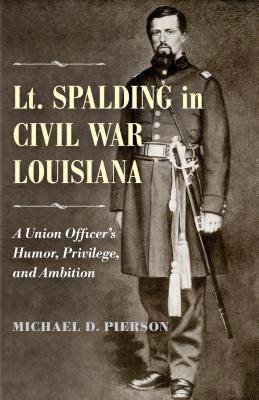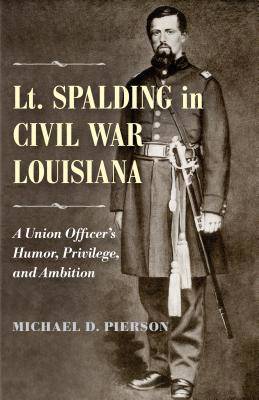
- Afhalen na 1 uur in een winkel met voorraad
- Gratis thuislevering in België vanaf € 30
- Ruim aanbod met 7 miljoen producten
- Afhalen na 1 uur in een winkel met voorraad
- Gratis thuislevering in België vanaf € 30
- Ruim aanbod met 7 miljoen producten
Lt. Spalding in Civil War Louisiana
A Union Officer's Humor, Privilege, and Ambition
Michael D PiersonOmschrijving
In July 1862, Union Lieutenant Stephen Spalding wrote a long letter from his post in Algiers, Louisiana, to his former college roommate. Equally fascinating and unsettling for modern readers, the comic cynicism of the young soldier's correspondence offers an unusually candid and intimate account of military life and social change on the southern front. A captivating primary source, Spalding's letter is reproduced here for the first time, along with contextual analysis and biographical detail, by Michael D. Pierson. Lt. Spalding in Civil War Louisiana lifts the curtain on the twenty-two-year-old's elitist social attitudes and his consuming ambition, examining the mind of a man of privilege as he turns to humor to cope with unwelcome realities.
Spalding and his correspondent, James Peck, both graduates of the University of Vermont, lived in a society dominated by elite young men, with advantages granted by wealth, gender, race, and birth. Caught in the middle of the Civil War, Spalding adopts a light-hearted tone in his letter, both to mask his most intimate thoughts and fears and distance himself from those he perceives as social inferiors. His jokes show us an unpleasantly stratified America, with blacks, women, and the men in the ranks subjected to ridicule and even physical abuse by an officer with more assertiveness than experience. His longest story, a wild escapade in New Orleans that included abundant drinking and visits to two brothels, gives us a glimpse of a world in which men bonded through excess and indulgence. More poignantly, tactless jests about death, told as his unit suffers its first casualties, reveal a man struggling to come to terms with mortality. Evidence of Spalding's unfulfilled aspirations, like his sometimes disturbing wit, allows readers to see past his entitlement to his human weaknesses. An engrossing picture of a charismatic but flawed young officer, Lt. Spalding in Civil War Louisiana offers new ways to look at the society that shaped him.
Specificaties
Betrokkenen
- Auteur(s):
- Uitgeverij:
Inhoud
- Aantal bladzijden:
- 208
- Taal:
- Engels
Eigenschappen
- Productcode (EAN):
- 9780807164396
- Verschijningsdatum:
- 2/11/2016
- Uitvoering:
- Hardcover
- Formaat:
- Genaaid
- Afmetingen:
- 141 mm x 225 mm
- Gewicht:
- 399 g

Alleen bij Standaard Boekhandel
Beoordelingen
We publiceren alleen reviews die voldoen aan de voorwaarden voor reviews. Bekijk onze voorwaarden voor reviews.









